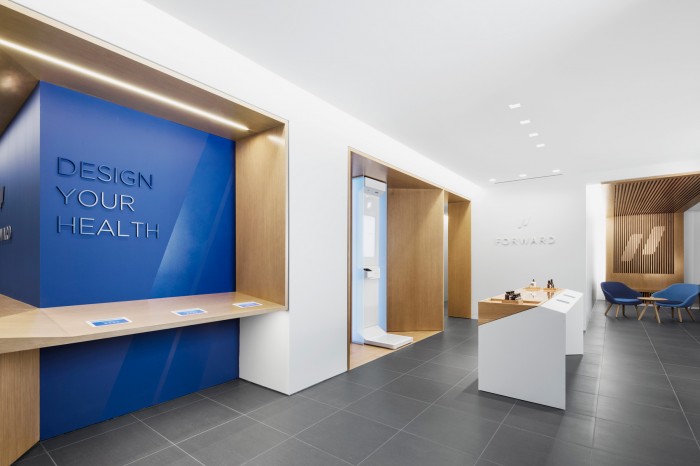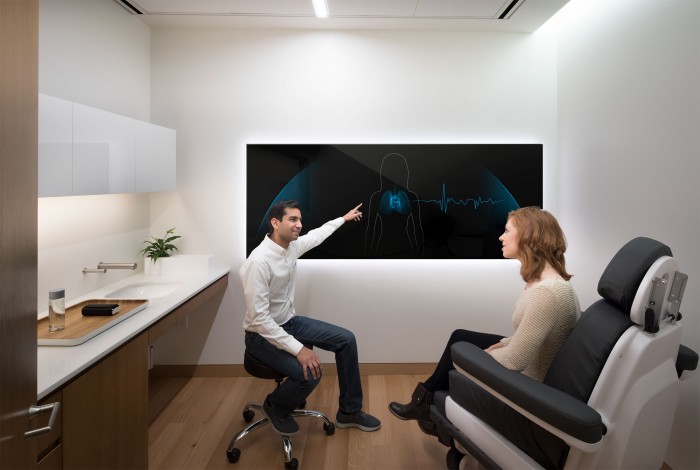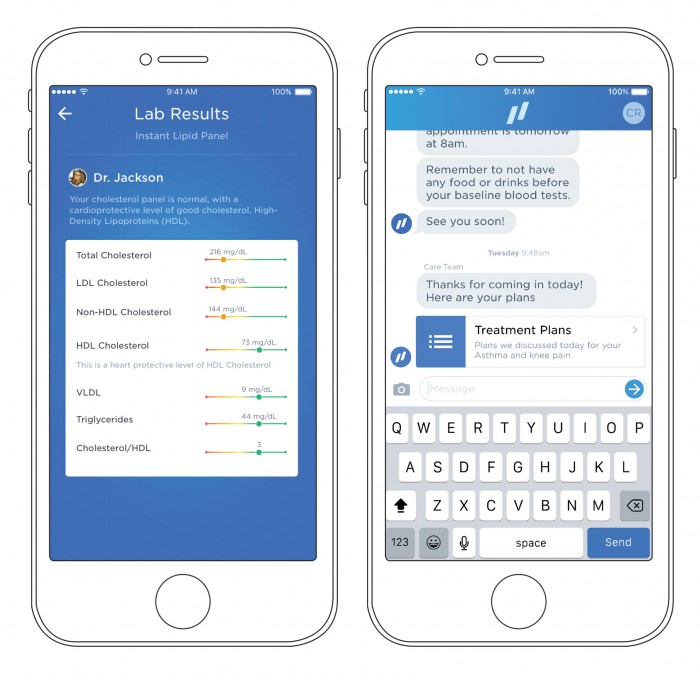For $149 a Month, the Doctor Will See You as Often as You Want

Imagine if your doctor’s office was more like an Apple Store mashed up with a fancy gym: a modern white-and-wood aesthetic, replete with fancy gadgets and gleaming touch screens, for which you paid a monthly fee to visit as often as you wished.
That’s the environment I stepped into last week upon entering the new medical clinic belonging to San Francisco health startup Forward, which opened to the public on Tuesday in the city’s Financial District.
Forward combines a variety of services—you can get help with your high cholesterol, a pap smear, and a vaccine for an upcoming overseas trip—with data gathered both at the office and, via wearable gadgets and Forward’s smartphone app, at home. The clinic has a built-in pharmacy; the first round of any drugs your Forward doctor prescribes is free. And blood tests that can be performed and quickly analyzed on site are included, too, as are any wearable gadgets the doc wants to send home with you. It does not accept health insurance.
Forward founder and CEO Adrian Aoun says the startup wants to change how patients approach going to the doctor. Most people just make an appointment when they’re sick or have a weird rash. But while you may see a doctor once or twice a year, “your body hasn’t stopped caring about its health in between,” he notes. It’s concierge medicine, Silicon Valley style, for $149 a month.

Not surprisingly, Forward emphasizes techie solutions. Your Forward doctor may give you a wireless blood pressure cuff to use, and the app will occasionally ping you to remind you to take a reading. You can message Forward doctors through the app, and even connect your activity tracker to it so the data it gathers is punted to your doctor as well (some doctors are not interested in this data, but Forward doctor Aaliya Yaqub says that even if this info isn’t totally accurate, it can help show trends).
The company also says its software will monitor you over time to let you know if anything strange appears to be going on and help your doctor come up with the best way to treat you.
So what’s it like to experience this kind of engagement in person? At first, a little overwhelming. The waiting room combines warm, recessed lighting, wood details, designer chairs, soothing background music, and strategically placed glass bottles of water. In the center of the room is a glass case, filled with a range of wearables.
There’s also a larger-than-life, gleaming white contraption that Aoun refers to as a body scanner. I stood on its platform and inserted two fingers into side-by-side sensors so it could compute things like my height, weight, temperature, pulse, and blood oxygen level. This data is sent on to Forward’s software so your doctor can see it, and to the smartphone app, too.

In the exam room, Yaqub—previously a doctor at Facebook—ran me through a fictional patient’s office visit by tapping different things like “exercise & diet” and “medications” on a giant touch screen to pull up more information like what blood-pressure drug the patient tried. She placed a wireless stethoscope on my chest, and the rhythm of my heart beating popped up on the screen in front of us.
Aoun says “hundreds” of people are currently using Forward, and most of these are people who can afford such preventive care (the company is giving free memberships to some people who can’t afford the fee). For many San Franciscans who aren’t wealthy or already focused on the idea of the quantified self, though, Forward’s offerings may be a tough sell, since you’d need to keep paying for regular health insurance on top of the membership fee just in case you need any care or treatments that it doesn’t offer, like surgery or a trip to a specialist.
And these may be the people who could benefit from such services the most, says Mitesh Patel, an assistant professor of medicine and health-care management at the University of Pennsylvania.
“To really impact health on a population level, we have to figure out how to engage people who are harder to reach,” he says.
Keep Reading
Most Popular
Large language models can do jaw-dropping things. But nobody knows exactly why.
And that's a problem. Figuring it out is one of the biggest scientific puzzles of our time and a crucial step towards controlling more powerful future models.
The problem with plug-in hybrids? Their drivers.
Plug-in hybrids are often sold as a transition to EVs, but new data from Europe shows we’re still underestimating the emissions they produce.
Google DeepMind’s new generative model makes Super Mario–like games from scratch
Genie learns how to control games by watching hours and hours of video. It could help train next-gen robots too.
How scientists traced a mysterious covid case back to six toilets
When wastewater surveillance turns into a hunt for a single infected individual, the ethics get tricky.
Stay connected
Get the latest updates from
MIT Technology Review
Discover special offers, top stories, upcoming events, and more.